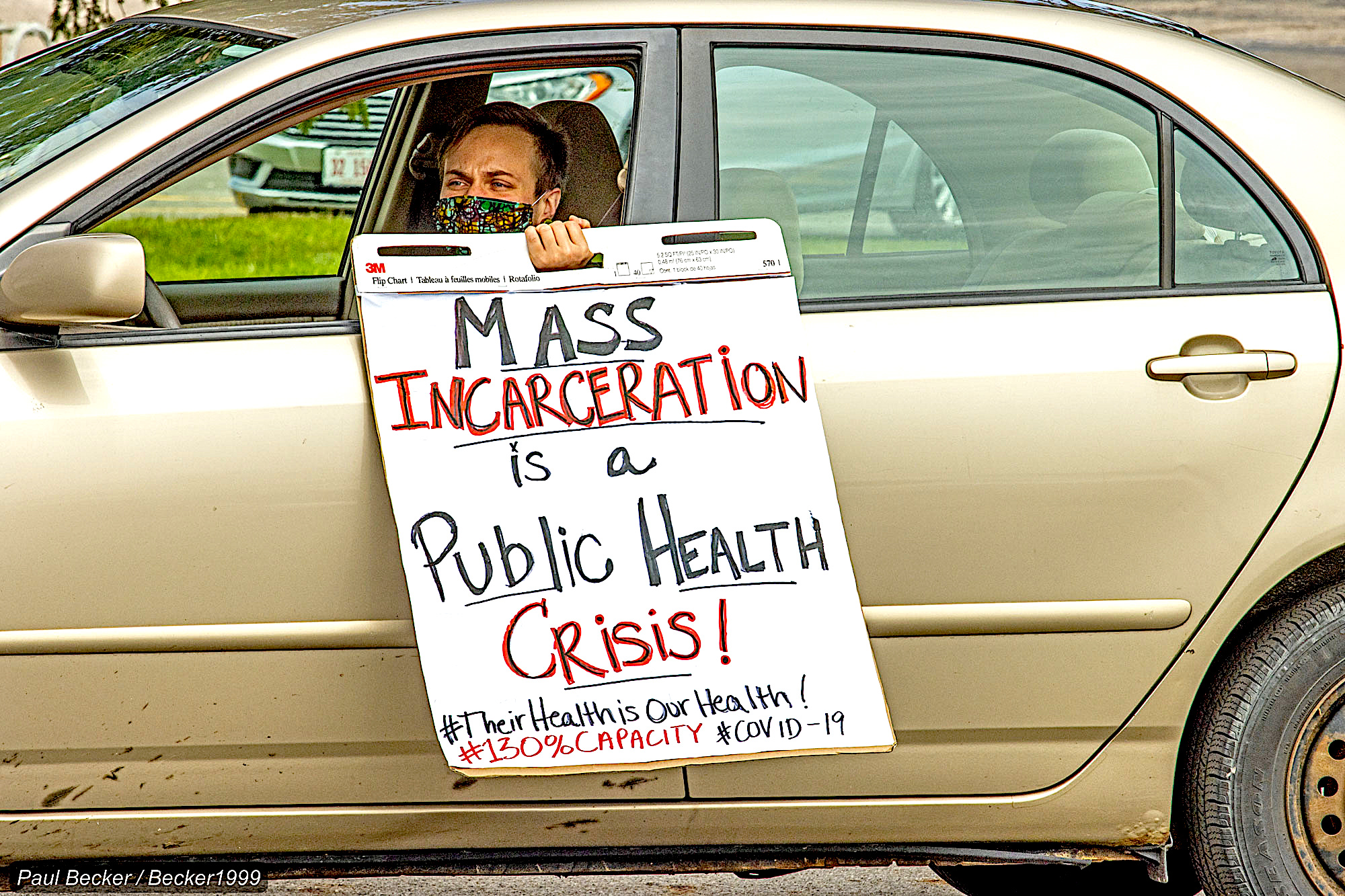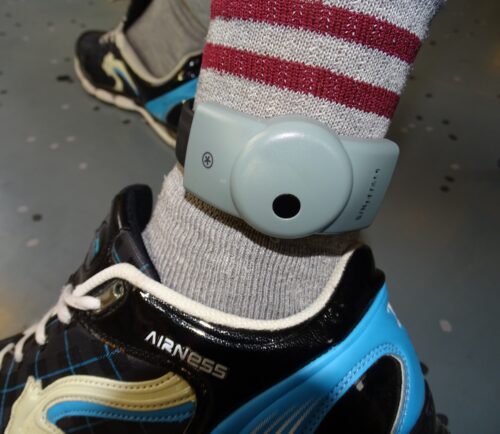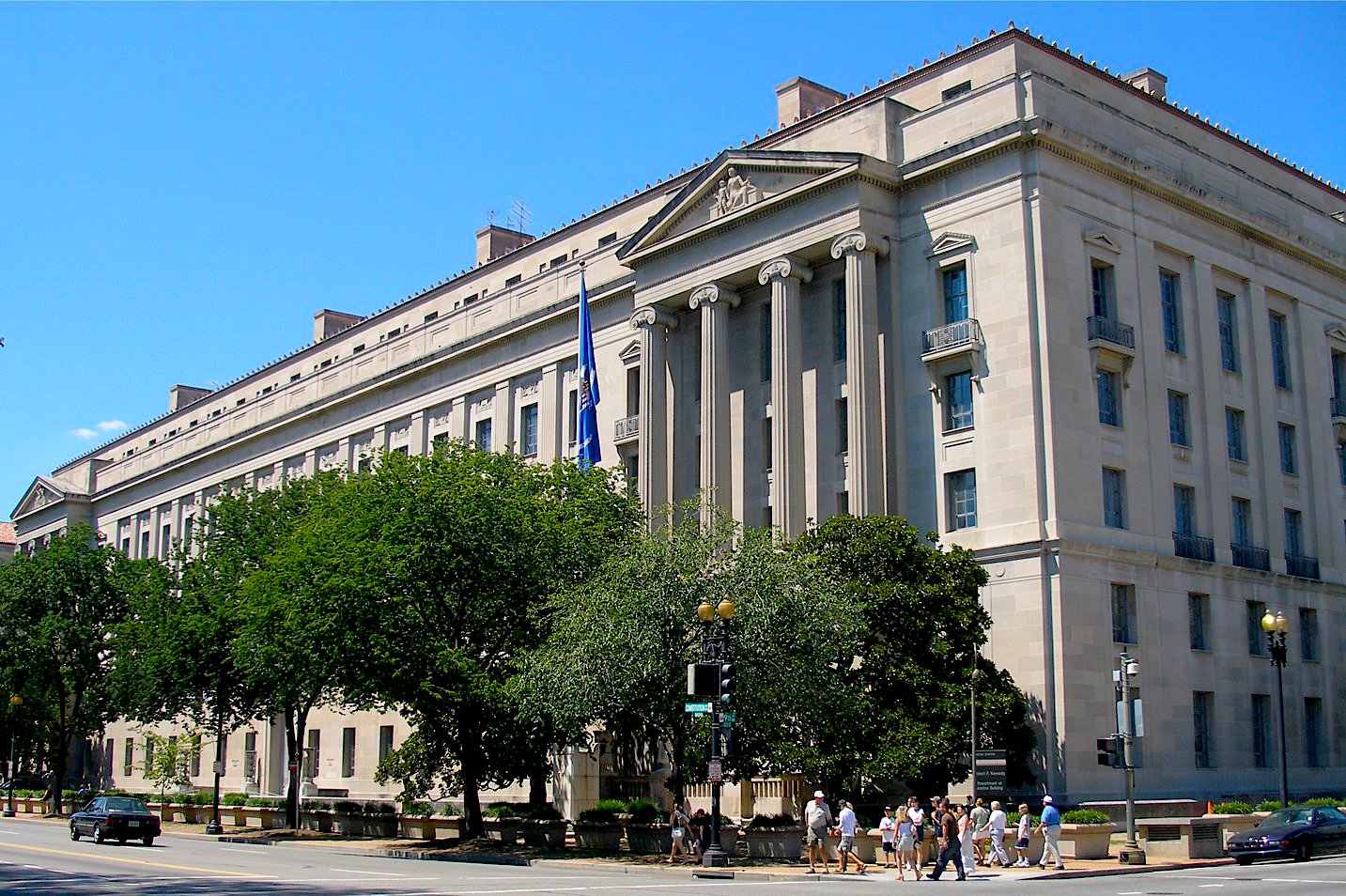Covid’s not over, but the DOJ is still pushing to lock non-violent offenders back up.

Protest event in Columbus, Ohio, April 24, 2020, calling for 20,000 early prison releases. (Becker1999, CC BY 2.0, Wikimedia Commons)
By John Kiriakou
Special to Consortium News
 Last month I wrote about some positive news that came out of the final days of the Trump administration. President Donald Trump pushed for passage of, and then signed into law, a measure that lifted a 26-year ban on giving prisoners federal education aid. It was a bold move that turned out to be less controversial than almost anybody had imagined.
Last month I wrote about some positive news that came out of the final days of the Trump administration. President Donald Trump pushed for passage of, and then signed into law, a measure that lifted a 26-year ban on giving prisoners federal education aid. It was a bold move that turned out to be less controversial than almost anybody had imagined.
At around the same time, Congress for the first time created the “Congressional Bureau of Prisons Reform Caucus,” a bipartisan group intended to “increase oversight of the federal Bureau of Prisons (BOP) and to bring accountability to decisions made by its executives.” For the first time, perhaps ever, Congress is finally coming to the realization that the prison system is broken and needs to be overhauled. It’s a giant leap forward.
Not all is milk and honey at the Justice Department, however. Career employees at the DOJ — those civil servants who are not political appointees — decided with only hours left in the Trump administration that they would end a policy of home confinement for non-violent, low- or minimum-security prisoners to protect them from Covid.

Electronic location-tracking device. (Jérémy-Günther-Heinz Jähnick, Wikimedia Commons, CC BY-SA 3.0)
A year ago, the Trump administration had quietly enacted a policy that would allow prisoners at high risk for Covid, who were housed in minimum-security or low-security prisons, and who had been convicted of non-violent crimes, to finish out their sentences at home. Each prisoner was fitted with an ankle bracelet and was assigned a federal probation officer to monitor his or her movements (or lack thereof). The program worked. There is literally not one single example of any of these prisoners violating the terms of their home confinement or committing another crime. The savings to the taxpayer is in the millions of dollars.
So why is the Biden administration allowing preparations to send them all back to prison?
In a memo authored by the Justice Department’s Office of Legal Counsel, the rationale is simply that “the rules are the rules.” It argues that the Bureau of Prisons should be “required to recall (to prison) any released prisoners who have not yet reached the six month or 10 percent threshold of time remaining on their sentences.” That’s unnecessarily arbitrary. And it’s dangerous for both the BOP and for prisoners at risk for Covid. Let me give you an example.
Just One Example
One of my cellmates when I was incarcerated at the Federal Correctional Institution at Loretto, Pennsylvania, was Frank Russo. Frank had been the Cuyahoga County auditor, one of the most powerful Democrats in the state of Ohio. He was widely considered a soon-to-be candidate for governor when he was arrested and charged with dozens of counts of corruption, bribery and conspiracy.
Frank decided to testify about his involvement in a $1 million kickback scheme, and his testimony was instrumental in putting 70 people behind bars. His cooperation got his 22-year prison sentence reduced to 14 years, but he still had to pay $7 million in fines and restitution. With good behavior, he was scheduled to be released in 2024. Even though Frank was technically a “rat,” everybody at Loretto loved him. It was easy to see how he succeeded as a politician. He was a guy who wanted to make everybody happy. I thoroughly enjoyed his company.

U.S. Department of Justice headquarters in Washington. (CC BY-SA 3.0, Wikimedia Commons)
One day in 2014 while waiting in line to get his insulin shot, Frank suffered a major heart attack and collapsed in the prison medical unit. An ambulance took him to a local hospital, where he remained chained to a bed for three weeks. After that, he was transferred to the Federal Medical Prison at Fort Devens, Massachusetts, and then to a major BOP medical prison in Butner, North Carolina.
Frank remained there until last year, when he was deemed to be at critical risk for Covid. He was then sent home with an ankle bracelet to his family in Cleveland. Frank is 70 years old and he suffers from advanced heart disease. He was incarcerated for a non-violent crime. There are only three years to go on his sentence before he would be released anyway, provided that he lived that long. And it’s insanely expensive to provide the medical care necessary for him to remain in prison. What threat is this man to society? Why should the taxpayer pay to lock him up again?
This is, of course, just one example. But multiply it by thousands of men and women. Remember, the United States has 5 percent of the world’s population and 25 percent of the world’s prison population. We are arguably the most over-criminalized society in the world. Are we better off — is society safer — with non-violent prisoners, many of them geriatric, locked up and at risk of Covid? I say no. And I hope that somebody in the Biden Justice Department puts his or her foot down, overrules the career paper-pushers, and brings some common sense to the issue.
John Kiriakou is a former CIA counterterrorism officer and a former senior investigator with the Senate Foreign Relations Committee. John became the sixth whistleblower indicted by the Obama administration under the Espionage Act — a law designed to punish spies. He served 23 months in prison as a result of his attempts to oppose the Bush administration’s torture program.
The views expressed are solely those of the authors and may or may not reflect those of Consortium News.



I can’t see much positive change coming from the wholly establishment Biden administration. He along with his pal Hillary Clinton represent the centrist war oriented wing of the Democratic Party. I don’t see any significant humane reform coming from them.
TRUMP BAD; anything connected to him has to be reversed for partisan reasons. Trump did the same to Obama initiatives (except RUSSIA!!! where Trump was much harsher than Obama, for self-preservation).
“Biden bragged about [his] harsh 1992 crime bill that did ‘everything but hang people for jaywalking'” I’m sure, in private, Biden is still proud of locking everyone up for drugs (except Hunter of course). Don’t expect any major positive changes in the carceral system from him. Domestic Terrorism is his new love.
The author repeats the stereotypical view among nice, cuddly, liberal centrists that the state should release the ‘non, non, nons’ – the people in prison not in for violent, sexual or serious offences. The data on recidivism don’t support this, as many of the excluded people are far less likely to reoffend. Also, it refuses to grasp the nettle of what to do with people do commit the less nice offences. Should they be treated as less than human? Restorative and transformative justice practices offer many solutions, none of which involves punishing people.
You’re wrong, wrong, wrong. Look at child sex offenders. Their recidivism rates are astronomical. And for some people, prison is punishment, not rehabilitation. If society is safer with you locked up, then I want you to remain locked up.
You’re a good human being, John K. So glad you are always in the front line standing for what’s right.
Totally, David, totally…
This country instigated (under Clinton – with Biden’s support) the most draconian of prison term set ups imaginable, so long as you were, generally, not low melanin and fairly to really well off. Crack getting higher sentences in stir – indeed sentences – than a much greater quantity of powder cocaine (low melanin usage – and how often do the heat hang about middle to upper middle class low melanin neighborhoods???); those “three times and your out” or whatever the phrase to encompass the appalling belief that after you’ve stolen over a while and individually three slices of pizza, with the third you’ll be banged up forever…..
But all too many in this country seem to be of a profoundly vengeful, vicious, unforgiving mindset – despite their so-called clinging to religion…
Biden wants to prove he’s a tough guy. We know that based on his performance at the Council on Foreign relations bragging about how he threatened to withhold the $billion dollar bribe to push the Ukrainians to fire the Ukrainian prosecutor that our government didn’t think they should have serving in that office.
He’s obviously afraid to show some humanity lest someone calls him chicken….
That’s the level of maturity we have in Washington.
It doesn’t matter of it saves us taxpayers $billions. or if it eases some of the pain and suffering.
He’s our tough guy.
On second thought, maybe there’s more to it – Biden’s modus operandi from the beginning has been to support the institutional framework no matter if it’s rotten at the ethical/moral center. That’s where he’s comfortable – he’s the point guard in politics of smelling out the center of gravity of the power structure and showing that he’s “on it”, he’s “with it”.
If that’s true – and I’m just trying to untangle WTF may be driving this man and driving the madness of this country – then in this case it’s the prison industrial complex that he’s protecting and by inference those who profit from it.
The humane, intelligent and constructive thing to do is what John Kiriakou so reasonably explains here.
If Biden undoes what the Trump administration started – perhaps the best thing Trump may have done in a long line of bizarro behavior – he’s proving that he’s reconstructing what Trump tore down. No thought from Joe, so far anyways, that it was a good thing for Trump to do for many reasons. No the structure must remain. To hell with stopping the spread of COVID19, to hell with ending some needless suffering, to hell with what makes sense both financially and ethically.
Joe wants to be seen by the powerful as the stalwart guardian of the order.
But he’s not insane and therefore he can be pushed to shift to a better course….hope that happens here.
Trump was reviled for trying to tear everything down – I have to guess he did it to satisfy his inner rage from painful childhood experiences based on what his niece shared.
The inner psyche of these people should be the first thing we care about when we elect someone.
Hi evelync…a side remark, but reveals clearly the typical MSM Newspeak by Omission as demonstrated by NPR, there was all of this stuff about Hunter Biden’s BBC interview…But nary a mention (by him?) on NPR or the BBC World Service of his dad’s bragging about the bribe to get rid of the existent Ukrainian prosecutor (who just happened to be looking into the bribery and corruption at Burisma) and if I recall right, on the same video JB boasting about how his influence got his son his spot on that company’s board at $50K/month…
I honestly do not think Biden has any humanity, except when it concerns his immediate family…those with humanity would not be keen to drone missile, bomb, invade, support any war, especially those which solely fulfill “the commitment” to boost to the moon the MIC profit margins, etc., etc. He makes a lot about his religious beliefs, which, in itself, suggests he has no compunction.
He is DC to the marrow…taxpayer funded for getting on for 50 years; comfortable with that, too…And buddy-buddy with all those heinous lobbying groups, some more heinous than others…baksheesh…
With all the drug convictions, the political prisoners, you had as an example to be released a damn politician? The blood-sucking parasite who stole our money, lied, and was a part of the worst criminals in the world? You want to release a damn politician? Every one of them should be incarcerated; and you want to release one? Are you out of your mind? He’s a nice guy. Yes, and so was Hitler quite nice to his friends. Wake up!!!
You’re comparing Hitler (!) to some old bureaucrat who’s already done hard time, is near death, and has 3 years to go? Really? So, spend hundreds of thousands on the guy (the taxpayer’s money) to keep him locked up in a prison hospital? He has to pay 7 million in restitution– did you miss that part? Should he be drawn and quartered before he’s sent home?
Tim- That somebody is “nice” does not mean he is good. Many inmates serve decades for victimless crimes, such as drug use. They serve longer sentences for much lesser crimes. A black man would get life imprisonment for that crime, or a decade for stealing a thousand dollars. I have been imprisoned for a year for words said, and even was incarcerated twice for the same incident. If this author had given an example of a poor urban disadvantaged drug user who was spending time working out, reading, and benefiting other inmates, of course I would agree that he should be let out. But this is a white-collar crime by a would-be politician, and involves stealing millions from taxpayers. IF he had stolen from rich people, his punishment would have been worse, and I would advocate his release. His values are skewed, he wants privilege and riches when he was already endowed with a decent income. I have a small income- $17k- and would never steal or do drugs. This guy has wrong values, is serving as he should, and if you have any love for any politician, you are deceived and/or evil. They are not representatives, they are bought pawns for the rich and powerful, as anybody with half a brain or more can see. By the way, I advocate for restitution instead of prison for most crimes, but you want people to be able to steal from the taxpayers unpunished and uncorrected.
You equate a corrupt politician to Adolph Hitler? Hahaha. Nice try.